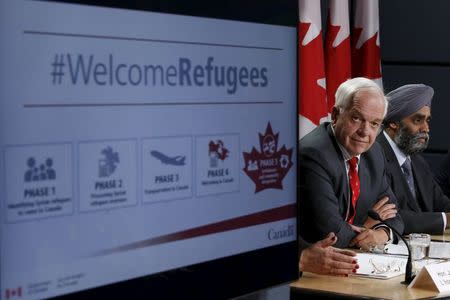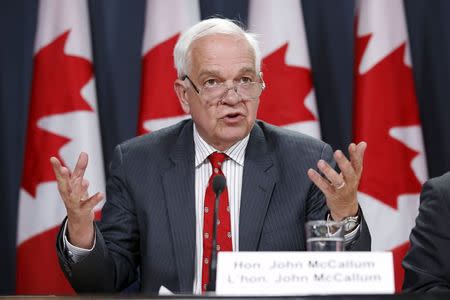Canada refugee airlift hampered by exit visa requirement: minister
By Randall Palmer OTTAWA (Reuters) - Canada's plan to take in 25,000 Syrian refugees in the next three months is being hampered by the requirements in their host countries to get exit visas, Citizenship Minister John McCallum told Reuters on Wednesday. The question of exit visas is "one of a number of challenges that are not fully resolved," he said. The minister said Ottawa's decision to push back a self-imposed deadline to the end of February from year-end had nothing to do with pressure from Washington over security concerns. McCallum also explained the decision to exclude unaccompanied, heterosexual, single adult men from government sponsorship by saying single men were more likely to be a security risk and heterosexual men were less vulnerable to persecution than gay men. McCallum was one of several ministers who announced plans on Tuesday to take 25,000 Syrian refugees from Turkey, Lebanon and Jordan by Feb. 29. These countries require exit permits of the refugees and the process was particularly slow in Lebanon. Canada's foreign minister, Stephane Dion, called his Lebanese counterpart to ask to help speed it up. There did not seem to be any intent to slow things down, he said, adding regional leaders were happy Canada was taking refugees. "But if the leaders are jumping up (and down) with joy, it doesn't mean that everybody down the chain is speedy. So it's the whole system," McCallum said. Prime Minister Justin Trudeau had pledged ahead of Canada's October election to bring in 25,000 by year-end, but said on Wednesday public security concerns after the Paris attacks were part of the reason for delaying. McCallum, asked whether the delay was partly because of pressure from Washington, responded: "It had absolutely nothing to do with that. There was no pressure." He said he had spoken with U.S. Homeland Security Secretary Jeh Johnson and at no point had Johnson said he was concerned. McCallum said the decision to give preference to gay, bisexual and transgendered men over heterosexual unaccompanied men in whom the government will sponsor was partly because "they are persecuted intensely" in many Middle Eastern countries. Heterosexual, single adult men will only be allowed under Canadian federal sponsorship if they are accompanying their parents as part of a family unit. Asked if single men were excluded partly because of the possibility of radicalization or other security concerns, he said: "I think that is the case historically, but it is also the case they are less vulnerable." (Reporting by Randall Palmer, editing by G Crosse)

 Yahoo News
Yahoo News 

